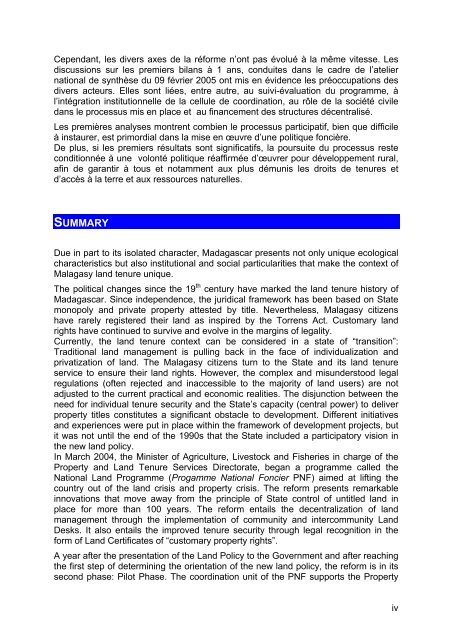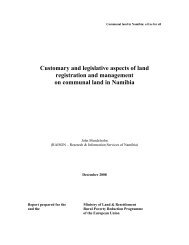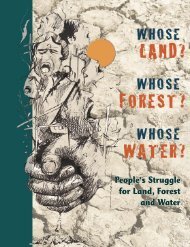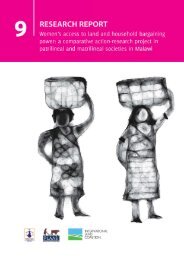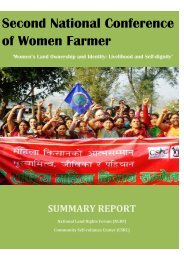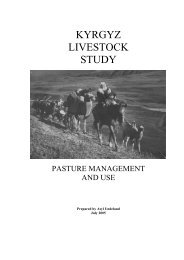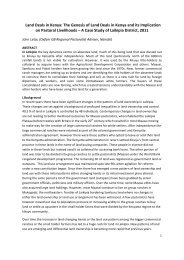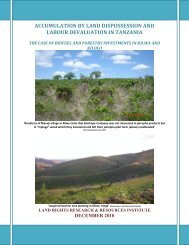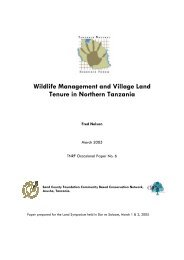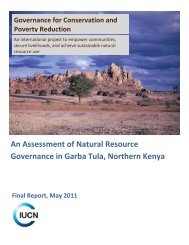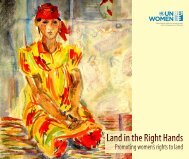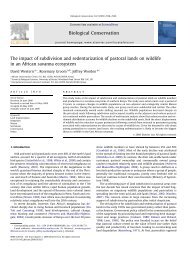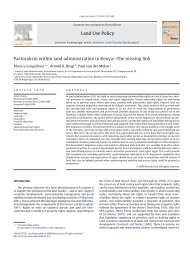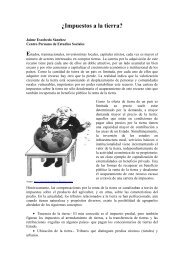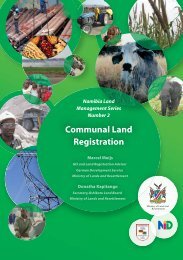experience recente de madagascar et du programme ... - Land Portal
experience recente de madagascar et du programme ... - Land Portal
experience recente de madagascar et du programme ... - Land Portal
You also want an ePaper? Increase the reach of your titles
YUMPU automatically turns print PDFs into web optimized ePapers that Google loves.
Cependant, les divers axes <strong>de</strong> la réforme n’ont pas évolué à la même vitesse. Les<br />
discussions sur les premiers bilans à 1 ans, con<strong>du</strong>ites dans le cadre <strong>de</strong> l’atelier<br />
national <strong>de</strong> synthèse <strong>du</strong> 09 février 2005 ont mis en évi<strong>de</strong>nce les préoccupations <strong>de</strong>s<br />
divers acteurs. Elles sont liées, entre autre, au suivi-évaluation <strong>du</strong> <strong>programme</strong>, à<br />
l’intégration institutionnelle <strong>de</strong> la cellule <strong>de</strong> coordination, au rôle <strong>de</strong> la société civile<br />
dans le processus mis en place <strong>et</strong> au financement <strong>de</strong>s structures décentralisé.<br />
Les premières analyses montrent combien le processus participatif, bien que difficile<br />
à instaurer, est primordial dans la mise en œuvre d’une politique foncière.<br />
De plus, si les premiers résultats sont significatifs, la poursuite <strong>du</strong> processus reste<br />
conditionnée à une volonté politique réaffirmée d’œuvrer pour développement rural,<br />
afin <strong>de</strong> garantir à tous <strong>et</strong> notamment aux plus démunis les droits <strong>de</strong> tenures <strong>et</strong><br />
d’accès à la terre <strong>et</strong> aux ressources naturelles.<br />
SUMMARY<br />
Due in part to its isolated character, Madagascar presents not only unique ecological<br />
characteristics but also institutional and social particularities that make the context of<br />
Malagasy land tenure unique.<br />
The political changes since the 19 th century have marked the land tenure history of<br />
Madagascar. Since in<strong>de</strong>pen<strong>de</strong>nce, the juridical framework has been based on State<br />
monopoly and private property attested by title. Nevertheless, Malagasy citizens<br />
have rarely registered their land as inspired by the Torrens Act. Customary land<br />
rights have continued to survive and evolve in the margins of legality.<br />
Currently, the land tenure context can be consi<strong>de</strong>red in a state of “transition”:<br />
Traditional land management is pulling back in the face of indivi<strong>du</strong>alization and<br />
privatization of land. The Malagasy citizens turn to the State and its land tenure<br />
service to ensure their land rights. However, the complex and misun<strong>de</strong>rstood legal<br />
regulations (often rejected and inaccessible to the majority of land users) are not<br />
adjusted to the current practical and economic realities. The disjunction b<strong>et</strong>ween the<br />
need for indivi<strong>du</strong>al tenure security and the State’s capacity (central power) to <strong>de</strong>liver<br />
property titles constitutes a significant obstacle to <strong>de</strong>velopment. Different initiatives<br />
and <strong>experience</strong>s were put in place within the framework of <strong>de</strong>velopment projects, but<br />
it was not until the end of the 1990s that the State inclu<strong>de</strong>d a participatory vision in<br />
the new land policy.<br />
In March 2004, the Minister of Agriculture, Livestock and Fisheries in charge of the<br />
Property and <strong>Land</strong> Tenure Services Directorate, began a <strong>programme</strong> called the<br />
National <strong>Land</strong> Programme (Progamme National Foncier PNF) aimed at lifting the<br />
country out of the land crisis and property crisis. The reform presents remarkable<br />
innovations that move away from the principle of State control of untitled land in<br />
place for more than 100 years. The reform entails the <strong>de</strong>centralization of land<br />
management through the implementation of community and intercommunity <strong>Land</strong><br />
Desks. It also entails the improved tenure security through legal recognition in the<br />
form of <strong>Land</strong> Certificates of “customary property rights”.<br />
A year after the presentation of the <strong>Land</strong> Policy to the Government and after reaching<br />
the first step of <strong>de</strong>termining the orientation of the new land policy, the reform is in its<br />
second phase: Pilot Phase. The coordination unit of the PNF supports the Property<br />
iv


